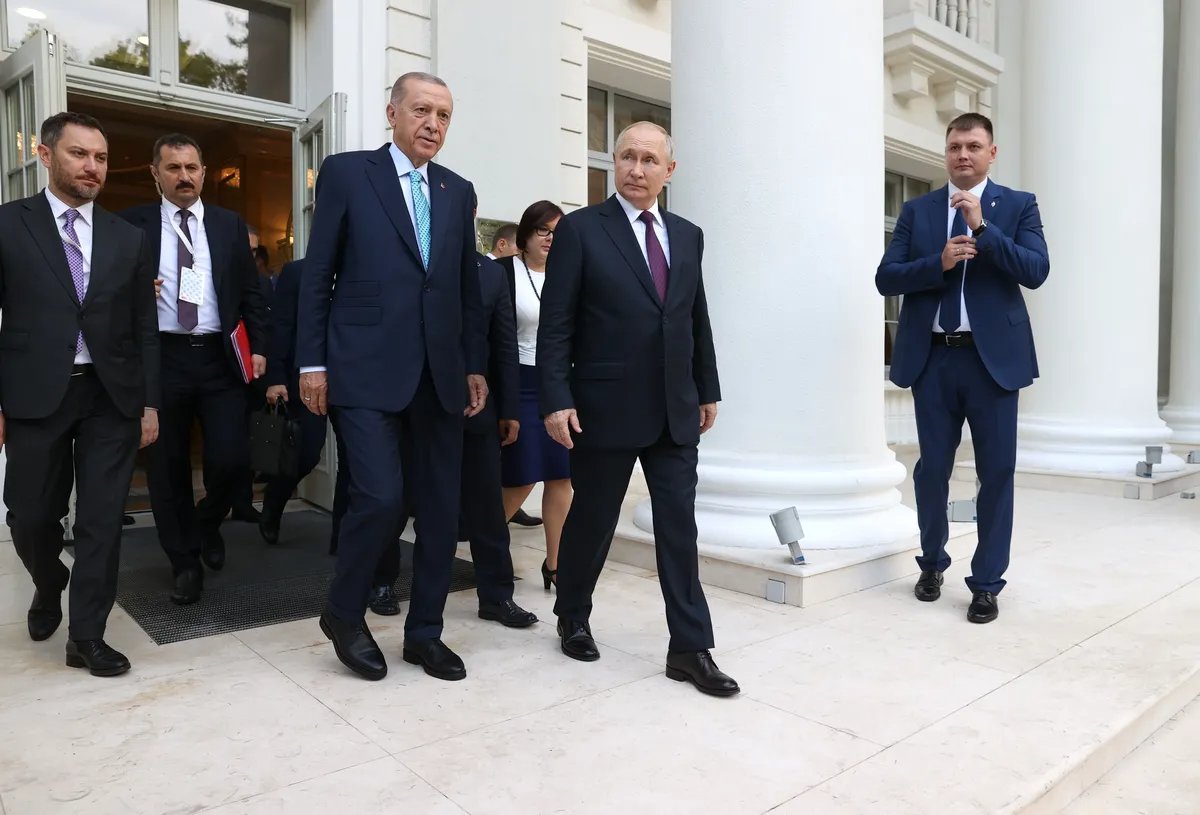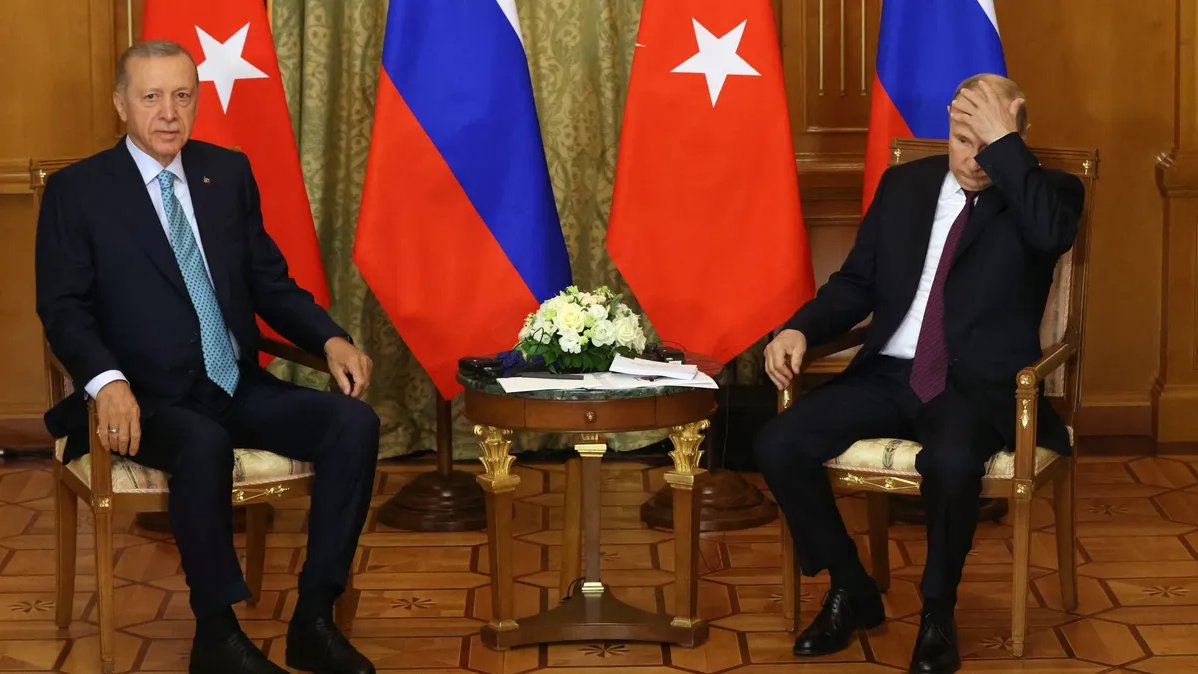If any single empire is to profit from the havoc unleashed on the world by Vladimir Putin’s full-scale invasion of Ukraine, it will be that of Turkey rather than Russia. Long the main beneficiary of the war in his backyard, Turkish President Recep Tayyip Erdogan continues to play an outsized role in the conflict as evidenced by his meeting with Putin in Sochi on Monday and Volodymyr Zelensky’s symbolic choice of Rustem Umerov, a Crimean Tatar, to be Ukraine’s new defence minister the day beforehand.
Erdogan has been playing both sides in the conflict off against each other from the very beginning, acting as a mediator and a pillar of support for Kyiv and Moscow alike. Aware of Turkey’s strategic significance, both parties have been actively vying to win his backing, constantly raising the stakes as they do so.
Ankara’s ability to influence the course of the war has always been clear. Erdogan's decision to close the Turkish straits to maritime traffic days after Russian tanks began rolling towards Kyiv prevented Russian cargo ships from entering the Black Sea, possibly thwarting a naval assault on Odesa. Turkey has also been supplying crucial Bayraktar drones to Ukraine, and while Putin threatened the West with nuclear weapons if it intervened in the war, he notably addressed not a single word on the subject to the Turkish leader.
Western sanctions on Russia have had the unintended effect of transforming Turkey into a thriving marketplace for Russian companies to make vital purchases as well as somewhere to stash their cash.
Turkey has also emerged as the principal beneficiary of the Black Sea grain deal, the agreement Erdogan brokered to enable Ukrainian agricultural exports amid Russia’s naval blockade.
Once the deal was reached, Ankara was able to buy up Ukrainian grain for peanuts before selling it on with an exorbitant mark-up. With the grain deal now dead, Putin hopes to sell Russian grain to Turkey in much the same way. Whatever he ultimately decides to do, Erdogan remains in charge of the entire operation.

Vladimir Putin and Recep Tayyip Erdogan after talks in Sochi on 4 September 2023. Photo: EPA-EFE/SERGEI KARPUKHIN
Turkey also stands to gain the most when it comes to spheres of influence. Calculating that Ankara can only benefit from any outcome, Erdogan’s once overtly expansionist foreign policy has been placed on hold since the war began. In his quest to restore Turkey to its erstwhile Ottoman-era glory, Erdogan is keeping his eye on three places above all else: Armenia, Syria, and Crimea.
Syria is considered a done deal. Russian forces have been fighting in the country’s civil war since 2015 but are expected to be pulled out sooner or later as Moscow needs them elsewhere. When that happens, Erdogan wants Putin to name him as his successor as the country’s main power broker.
A similar situation is unfolding in the South Caucasus.
With Putin beholden to Erdogan, the Armenian population in the disputed territory of Nagorno-Karabakh can no longer count on Russian military protection and has been enduring a months-long blockade by Azerbaijan, Turkey’s close ally.
The nomination of Rustem Umerov to be Ukraine’s new defence minister is similarly indicative of Erdogan’s influence. A Crimean Tatar politician who is rumoured to enjoy US support, Umerov became a leading figure in negotiating prisoner swaps with Russia due to his close ties with Turkey.
Russia and Ukraine both claim an inalienable right to control Crimea, seemingly oblivious to the existence of the Crimean Tatars. Umerov’s appointment as Ukraine’s defence minister serves as a clear reminder to Putin and the West that support for Crimean statehood could ultimately come from elsewhere. Even if the peninsula becomes a battlefield and the Russian-speaking majority is forced to flee, the Crimean Tatars, hardened by their mass deportation to Central Asia under Stalin, are likely to remain. Who will decide the fate of the region then?
Erdogan’s triumph aside, the war in Ukraine is essentially a conflict between two diametrically opposed political systems: autocracy and democracy.
To be clear, it’s very much not a case of Putin winning, but rather of western democracies losing, having proved themselves in the post-industrial age to be unable to respond effectively to the global rise of autocracy. Yes, they targeted Russia with economic sanctions that caused mild discomfort in both Moscow and corporate board rooms, but the main effect of sanctions has been the West losing its dominant global position in the fields of technology, business, and scientific innovation, with sanctions simply redirecting cash flows from US and Europe to India, China, and Turkey.
When Western governments imposed sanctions on Russia’s oligarchs it led to the confiscation of private property without so much as a court order, something that has undermined the West’s reputation as a safe haven for investment where personal assets are sacrosanct.
Perhaps most significant of all, the West has shown itself unwilling to supply Ukraine with the number of weapons it actually requires for a swift victory. The reasons for that choice are debatable, but the outcome is not: military aid to Ukraine is insufficient to support the country’s troops as they battle for their country’s existence.
In modern warfare, the winner is not usually a combattant, but a third country that profits from the conflict financially before earning respect and gaining influence by mediating its end.
The Russian invasion of Ukraine has inevitably rearranged the global order, upsetting established global patterns and alliances and forging new ones in their place. Autocracies such as China and Turkey are preparing to take centre stage when the conflict eventually ends. Obviously, Russia is not — but then again, nor is the West.
Join us in rebuilding Novaya Gazeta Europe
The Russian government has banned independent media. We were forced to leave our country in order to keep doing our job, telling our readers about what is going on Russia, Ukraine and Europe.
We will continue fighting against warfare and dictatorship. We believe that freedom of speech is the most efficient antidote against tyranny. Support us financially to help us fight for peace and freedom.
By clicking the Support button, you agree to the processing of your personal data.
To cancel a regular donation, please write to [email protected]

